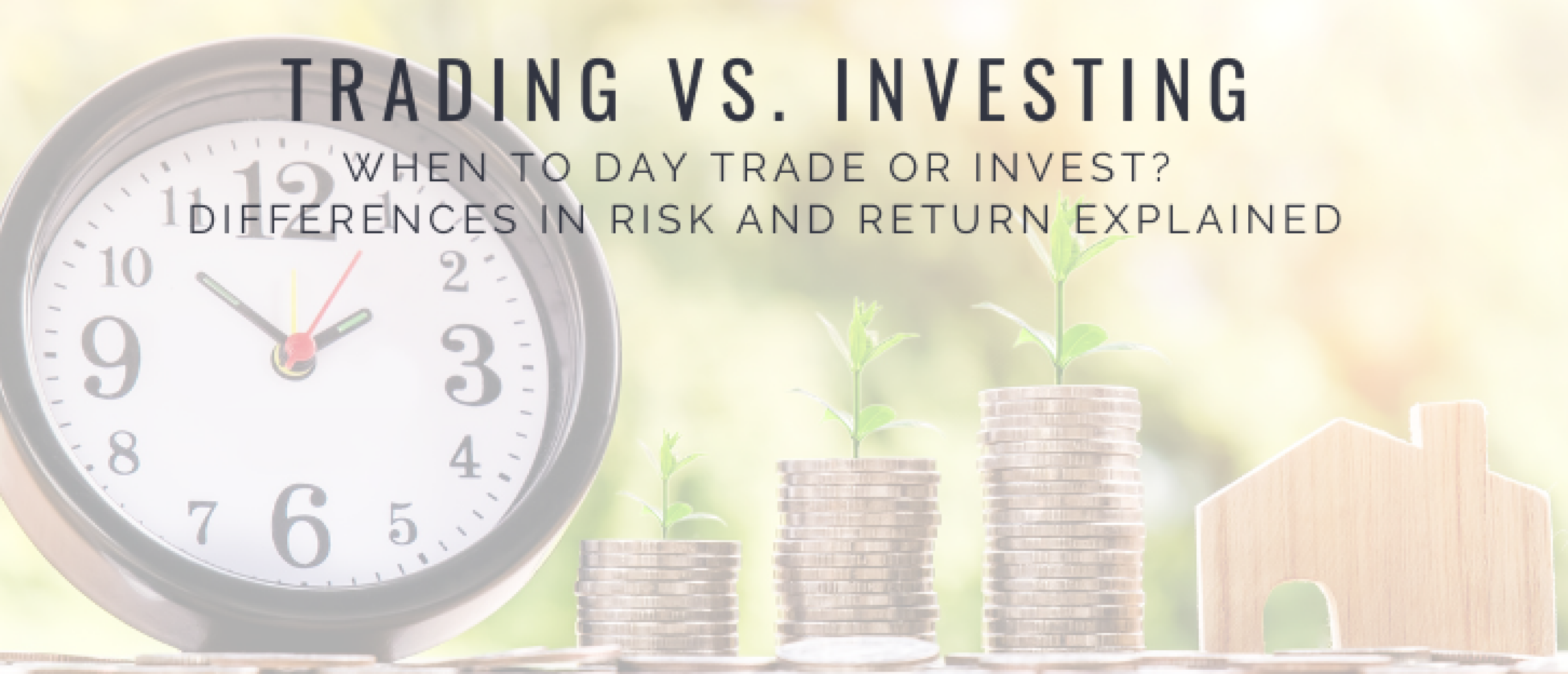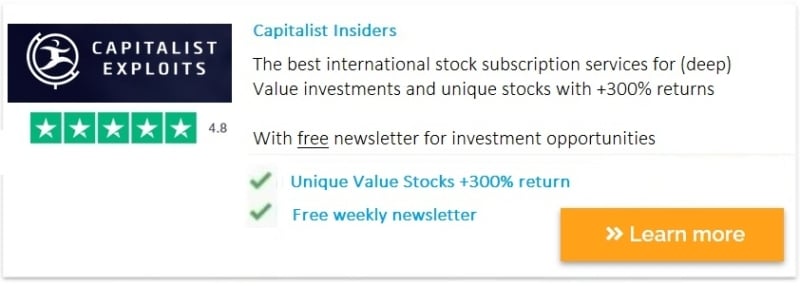Dear Happy Investor, Do you know the differences between day trading vs. investing? Some people start day trading, while others choose for investing. Is there a better choice? In this article we explain the differences between day trading or investing. In particular, we look at the differences in risk and return. There are arguments to be made for both "camps", although we from Happy Investors would always choose long-term investing.
On to sustainable financial success!
Day Trading vs. Investing: Key differences explained

Trading is a short-term and volatile process that involves frequent transactions depending on market trends. Compared to long-term transactions, such as mutual funds or bonds, it is relatively short. Commodities, stocks, currencies [forex], and other financial instruments are common examples of trading. The advantage of (day) trading vs. investing is that you can potentially make more profit.
A novice long-term investor can probably realize 8 - 10% annual returns based on historical returns (risk). An advanced long-term investor can probably realize 10 - 15% annual returns.
A trader can realize the same 10 - 15% profit every month. This does not have to be done on a daily basis. There are also swing traders who trade on the basis of weekly or monthly momentum. Similarly, at Happy Investors we research the best shares that are likely to outperform the market in the short term of 6 - 12 months (>25% average return). We call these Happy Value stocks with strong momentum. However, we only select Value stocks based on long-term potential. But also these stocks fluctuate on a weekly level by 5 - 10%. A swing trader can take advantage of this.
Trading is much more difficult than investing
Now day trading vs. investing may sound like a no-brainer, but it's not. Trading is dynamic and volatile; it is high-risk process where market trends and news reports directly affect the trade. This can result in large gains and losses. The problem with trading is that you have much less control. The price movement of strong companies is more predictable in the long run. However, in the short term (days or weeks) it is not. Moreover, you have no control over short-term news events that are actually irrelevant in the long run.
The main difference between day trading vs investing, is that a trader has to hedge risk much better. For every 50% you lose, you need 100% profit. That's a seriously high return!
The fundamental principle of trading is to buy when the price is low and sell when the price is high. There are various day trading strategies, such as reverse trading and short-selling, that only seasoned traders utilise to generate high profits in the short term. Such strategies are hazardous and should not be recommended by inexperienced beginners.
Investing is a long-term strategy where the goal is to steadily build wealth over time. Again, this can be done in a variety of ways. From index investing to individual stocks. We at Happy Investors invest exclusively for the long term because it suits our purpose. Anyone can become financially free in the long run. All you need is a good investment strategy and patience. Why take excessive risk when you don't have to?
Active speculation or passive wealth building?
A final crucial difference between day trading vs. investing is speculation vs. calculated risk. In trading, you speculate on price movements. In investing, you take a calculated risk. You invest in companies. You expect the best companies to generate more profit in the long run. Therefore, you take a calculated risk based on research and data. This significantly increases the probability of profit.
In fact, in the basics, successful investing is passive. You need to do proper research on unique companies once. You buy, and then you hold for the long term. This is completely different from day trading, where you are engaged in daily or weekly price fluctuations and risk strategies.
Day Trading vs Investing: Risks and Returns

In our view, we should always choose long-term investing. For us, investing is a means. Thanks to investing, we become financially free. And financial freedom is a means to a happier life. It is not a condition, but it makes life easier. This means that being happy is the real goal.
Why take unnecessary risks and choose day trading vs. investing? After all, with investing you can probably get a nice >8% return in the long run. With more knowledge and skill, this is even higher. With such returns you will become rich in the long run. Very rich.
Yet there are people who choose day trading vs. investing. And to be very honest: it is mainly lower educated people who choose this. Not because they are "less smart". They are not. But because they are less patient. Investing can feel slow and sluggish. While day trading can be a daily activity with adrenaline spikes. This is also why many people choose to invest in crypto. It's just a lot more fun.
Another reason people choose day trading vs investing is because of the potential returns.
Day trading can lead to higher returns than investing
Gains snowball quickly in day trading. For example, if you begin with $30,000 and earn 10% every month, you'll have $33,000 to start with the next month. If you gain 10% again, you'll have $36,300. If you make 10% every month for a year, you'll have over $95,000 at the end.
On the other hand, a day trading account might rapidly deteriorate if you lose 1% or 2% of your capital every day. For example, if you lost 1% every day for seven trading days, your account might drop from $30,000 to $27,961.96—roughly 7% of your initial capital.
If you started gaining 0.5% each day for the next seven trading days after that losing streak, you'd finish up with $28,955,43—still a loss. You'd need seven more days of 1% gains or more to cover your losses and generate extra gains.
No one is crazy. Everyone has her reasons for choosing investing or day trading. Just know that with day trading the risk is extremely much higher. Yes, an experienced trader can make a lot of money. A novice trader probably won't. More than 80% will lose money. Be aware of that.
When should I day trade or invest long-term?
On the surface, day trading and investing seem to be legitimate trading methods to accumulate long-term savings, yet they are opposed. Day trading is fast-paced, requires rapid transactions, and is based on short-term price changes. Professional day traders might trade hundreds of times each day.
In contrast, long-term investing involves a slower and more deliberate approach. One holds assets for months or years, not minutes and days. With a buy-and-hold strategy, another way of investing is used. Daily fluctuations become irrelevant. Investors focus on quarters and years.
We believe that 90% of all beginning investors are better off choosing investing vs. day trading. However, it is up to you to make your own choice. Moreover, combinations also exist. Think about swing trading. It is possible to invest in stocks for the long term. But on a monthly level you buy or sell some extra. In this way, you can potentially achieve higher profits. In fact, the "buy the dip" is also a kind of swing trade.
Do you have doubts about day trading or investing? Share your situation in the comments below. We may be able to provide tips.
Here are some more points of interest:
- Risk-tolerance: the risks of losing money at day trading are significantly higher.
- Speed Trading: day trading can give potentially higher returns. With investing, it is recommended to think in the long-term to create compound interest.
- Active vs Passive: day trading is always active while investing can be both active and passive
- Emotions: You need more strong control over emotions while doing day trading as you are already in a highly volatile market.
- Skill Level: You need an adequate skill level for both day trading and investing. However, the day trading may involve education in fundamental and technical analysis, while investing may require a deep study of the company's financials.
- Picking up Asset Classes: Day traders look for a volatile market to open their positions. At the same time, investors look for steady and consistent stocks having some stable growing trend.





![10x Best Brokers for Day Trading [2022] Europe vs. International](https://media-01.imu.nl/storage/thehappyinvestors.com/4861/responsive/6323031/best-day-trading-brokers-2560x1100_614_264.png)
![8x Best ETFs eToro to Buy [2022] Higher Yield, Lower Risk](https://media-01.imu.nl/storage/thehappyinvestors.com/4861/responsive/5981219/best-etf-etoro-2560x1100_734_315.png)
![What is the best thing to invest in? Stocks to Crypto [2022]](https://media-01.imu.nl/storage/thehappyinvestors.com/4861/responsive/5849118/what-is-the-best-thing-to-invest-in-2560x1100_614_264.png)
